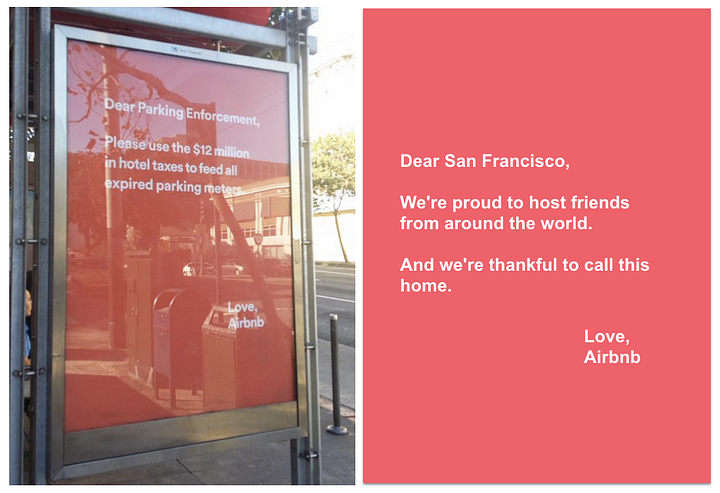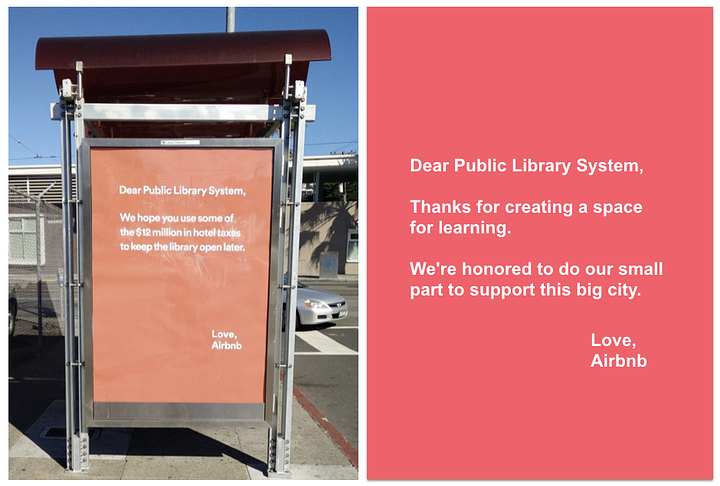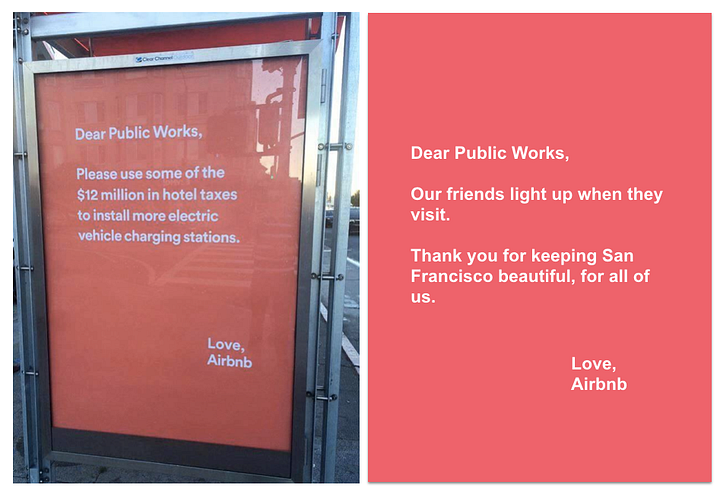Here's what the Airbnb ads could have looked like
Read this post on Medium.
Left, photo credit: Martha Kenney / Facebook via AdWeek; Right: fabricated ad by Wes Kao
Disrupting a static industry is hard. It’s even harder when the city you’re headquartered in hates you.
People are angry with Airbnb for recent billboards and bus shelter ads in San Francisco. The ads were a cheeky way to allude to Proposition F, which is up for voting in the next few weeks. The messages refer to the estimated $12 million in hotel taxes that Airbnb paid to the city in the last year.
But the campaign came across as passive aggressive and smug. Social media erupted, and Airbnb is taking the posters down.
This isn’t simply a local issue.
The public’s opinion of big tech companies has a tangible impact on how much leeway startups have to operate. Especially when legislation is involved.
Here’s why the ads failed, and what Airbnb should have done instead.
1. Flaunting money is a bad idea.
An Airbnb spokesperson said: “The intent was to show the hotel tax contribution from our hosts and guests, which is roughly $1 million per month. It was the wrong tone and we apologize to anyone who was offended.”
What is a hotel tax contribution? The average person is not going to research this topic.
They will, however, take the billboards at face value. Whining about $12 million dollars in taxes leaves a bad taste in everyone’s mouth.
As one user on Twitter said, “$12 million is nothing for a $25 billion company.”
2. People already think tech startups are arrogant and elitist.
This issue has been heavily reported on in recent news, and confirmation bias kicked in.
All of the following mental associations pop up: tech startups taking over the city, Dropbox tech bros kicking teenagers off a soccer field, a changing city landscape, gentrification, evictions, tech bubble.
These ads intensify the “us versus them” rift.
If you want to defend Airbnb, you are now forced to choose: are you a rich tech kid in a Google bus, or part of the diverse fabric of San Francisco?
3. Don’t joke about topics where you are considered part of the problem.
When running ads, every tech executive, startup founder, and head of marketing should ask themselves these questions:
“Are we trying to be funny? Are people going to take this the wrong way? Are we amplifying a sore subject? Are we giving our opponents ammunition against us?”
Other brands have gotten into trouble when they approached touchy subjects: Lululemon about their CEO getting fired, and McDonald’s about it taking 796 years for an employee to make a million dollars on minimum wage.
Humor is tricky. When in doubt, stick to poking fun at yourself.
What could Airbnb have done differently?
Airbnb could have started with a gracious attitude.
They could have emphasized being part of the city, rather than separate from it. They could have mentioned how lucky they are to contribute tocommunities within San Francisco, instead of whining about taxes.
I’m not one for critiquing without offering a few suggestions. In the spirit of this, I’ve re-created what the ads could look like if they built goodwill.

Left, photo credit: Eric Eberhardt / Instagram via SF Weekly
Right, fabricated ad: Wes Kao
Before: “Dear Parking Enforcement, please use the $12 million in hotel taxes to feed all expired parking meters.”
After: “Dear San Francisco, we’re proud to host friends from around the world. And we’re thankful to call this home.”

Left, photo credit: Martha Kenney / Facebook via AdWeek
Right, fabricated ad: Wes Kao
Before: “Dear Public Library System, we hope you use some of the $12 million in hotel taxes to keep the library open later.”
After: “Dear Public Library System, Thanks for creating a space for learning. We’re honored to do our small part to support this big city.”

Left, photo credit: Kevin Antonio Sorlano / Facebook via SF Weekly
Right, fabricated ad: Wes Kao
Before: “Dear Public Works, please use some of the $12 million in hotel taxes to install more electric vehicle charging stations.”
After: “Dear Public Works, Our friends light up when they visit. Thank you for keeping San Francisco beautiful, for all of us.”
